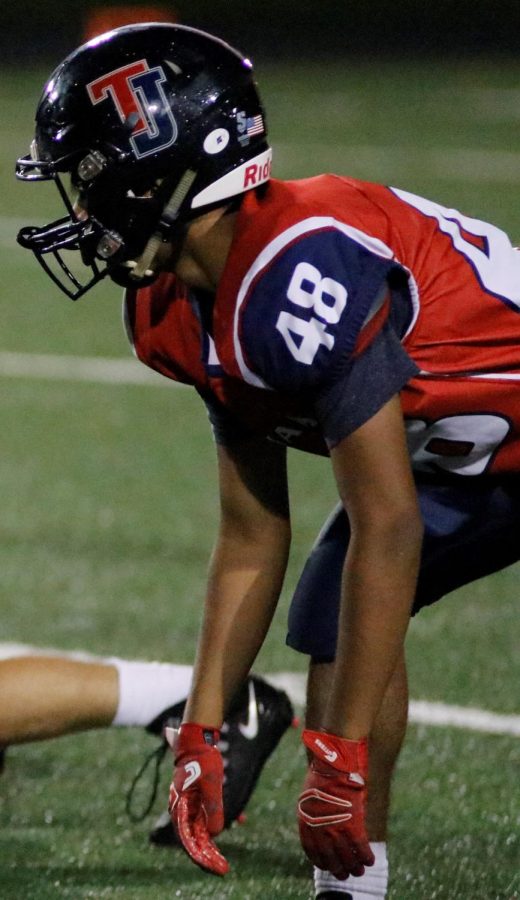School and Sports: A Balancing Act
How Junior Faaiz Memon learned to juggle football practice and schoolwork
Junior Faaiz Memon steadies his stance before in preparation for a play at a Friday night home football game. Photo courtesy of Lifetouch.
October 25, 2018
Junior Faaiz Memon jogs off the field, exhausted from another long day of practice, to shower off with some cool water. After getting his bruises treated and changing out of sweaty clothes, he then drops to the ground and, without delay, pulls out his math homework.
One of the largest causes for many students’ hesitation in sports participation is the concern of not getting enough time to complete homework. Memon, a varsity football player, has been balancing his time between playing football and getting school work done for two years. As soon as the school day ends, he spends most of his evenings at football practice.
“Practice is every weekday. Basically, practice starts at 4:30. And you’re supposed to get to the field early at 4:15. Football practice will go until 6:45, and when I need to get treatment for my injuries, after the practice, then I’m there for a little while. So 4-7 pm is the real commitment,” Memon said.
While practices start after 4pm, games start and last even later. Sometimes, their games end up exceeding the expected time interval.
“Games are on fridays. Games start at 7 pm and they can go pretty late. Last game went double overtime,” Memon said.
The main challenge that comes along with playing a sport is being able to manage school work. Since school ends at 4 pm and commute can reach up to one and a half hours, students get very limited time to complete homework while getting enough sleep. This is why time management becomes a crucial factor to maintaining one’s grades. Memon fits in time to do homework throughout the day, rather than saving all of his homework for late in the evening.
“When I need to, I’ll get work done on the bus in the morning, during lunch and JLC, between classes, and when I’m waiting for my dad to come pick me up. I get rest on the car ride back, and don’t mess around too much at home,” Memon said.
Memon feels that he has acquired the skills over time required to balance him playing football with his homework. As a result, his grades have not been affected too much during the football season.
“This far into the year, it doesn’t feel like homework has been too bad: overall things have been pretty good. I think I might be handling homework better this year just naturally because I’m more used to it now,” Memon said.
While using up his time wisely can get pretty exhausting at times, Memon’s passion for football powers him though all of the hardships associated with maintaining an athletic and academic life.
“Quitting on the team feels like a complete non-option when everyone’s working so hard to make the team as good as possible. Personally, I’ve played through so much pain and fatigue that even when I’ve gotten a couple hours of sleep and my calves feel like they’re [on fire], if I quit and don’t go to practice I’m quitting on everything I’ve put into it until that point,” Memon said.
In the end, Memon’s dedication for his sport keeps him motivated to be able to use his time wisely so that both his athletic and academic performance are optimal. It is ideal that a student finds an activity that not only keeps their body healthy, but also their mental state.
“I just love the sport and playing it takes my mind of off the other stresses of life,” Memon said.






